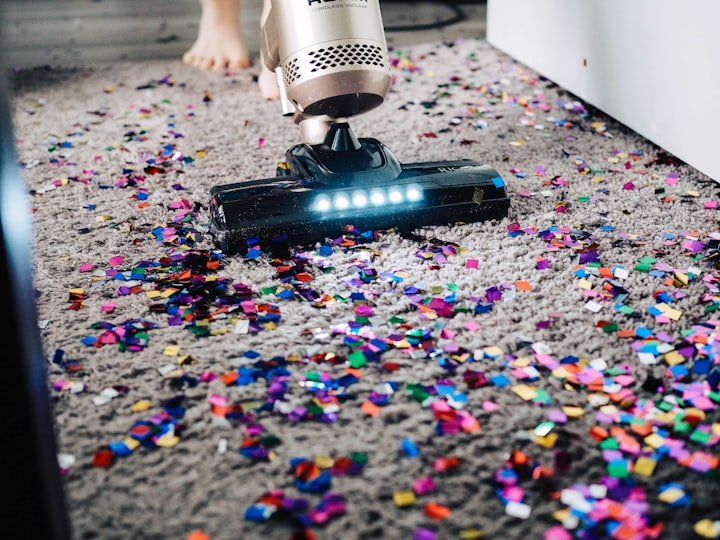The Psychological Reason Why You Feel the Urge to Clean When Upset
Repetitive actions are the easiest way to soothe temporary anxiety

I wouldn’t call myself an organized person. Contrary to the most popular advice of making your bed in the morning for success, my bed is almost always unmade. I prefer carefully disorganized surroundings. The only time this preference shift is when I am feeling overwhelmed.
This drives me into a Marie Kondo mode of dusting, mopping, cleaning, and organizing my space. The purge may take hours, but the result is well worth it. I always come out feeling much better than when I started.
The act of stripping, reorganizing, and clearing out my surroundings gives me an immediate sense of well-being. It’s therapeutic. The world outside the four walls of my room may be going to hell, but here, everything is where it should be. Cleaning provides this comfort for many of us.
Humans Thrive on Predictability
We may believe we want excitement, spontaneity, and variety in life, but the truth of the matter is humans are hard-wired to hate uncertainty.
A group of researchers conducted an experiment to illustrate the relationship between acute stress and uncertainty. The experiment involved the volunteers playing a computer game where they were required to overturn stones that may or may not have snakes hidden under them. If a snake appeared, they delivered an electric shock. The participants' stress levels were monitored through physiological parameters such as pupil dilation and sweating (skin conductance).
The result was that all measures of stress were highest when uncertainty was highest. Unpredictability was more stressful than knowing a future negative response (in this case, a shock to the left hand).
Predictability, on the other hand, helps create peace within our lives. It helps to center us when life throws its curveballs at us. Cleaning does the same thing that routines, rituals, and a to-do list do. We know what to to do and the exact route to get there. It gives us control.
When Everything Is Falling Apart, We Need Repetition
A 2015 study found ritualization might be an anxiety-reducing coping strategy. Faced with anxiety, we turn towards repetitive and predictable actions.
And what’s more repetitive than scrubbing every inch of your home? The uncertainty of a situation, like the pandemic combined with our own feelings of being unable to handle it, leads to us seeking familiarity and stability.
“If there is an order to the house or environment, we may feel safe,” said Martin Lang, an evolutionary anthropologist who led the study.
The act of establishing order alone can act as the “cognitive mechanism that can help people deal with anxiety.” — Martin Lang.
Obsessive cleaning does more than provide a comfortable source of repetitive actions. It gives us a sense of control and achievement while blocking out other stressors. Even something as small as organizing your music collection does more to ease anxiety by providing the comfort of knowing what you have to do. The feeling helps when everything else seems off balance.
“We have a tendency to cling to our familiar patterns, especially during periods of heightened stress,” says Jamie Zuckerman, a clinical psychologist. “It’s easier to rely on already-existing behavioral patterns than use up the extra cognitive function necessary to pause, take an inventory of one’s situation and surroundings, and make a conscious decision to engage in a new behavior.”
Doing repetitive tasks such as scrubbing or sweeping helps your brain enter a mindful state — or rather, zone out. This helps you observe your thoughts rather than react to it. And once the cleaning is done, it is followed by a sense of achievement that invariably gives a boost to our confidence.
Scrub Away but Don’t Overdo It
Ritualization can be highly effective in dealing with anxiety temporarily. But if you get carried away with handling every speck of dust or pick up your broom only when you have some other task to attend to, it can become an avoidance tactic.
Here’s what you can do to use cleaning to destress :
Set a specific time for cleaning, for example, first thing in the morning.
Limit the time you spent so you don’t avoid other tasks.
Be mindful of your emotions.
Hold yourself accountable if you are using it as an evasion tactic.
The simple act of cleaning gives us an easy but efficient action to deal with everyday stress and anxiety. A fragment of control when everything else is askew. It definitely helps me in gaining clarity and understanding about whatever is bothering me. And, well, science agrees! So, get out those mops and clear the clutter around and inside you.
About the Creator
Eshal Rose
Writer of thoughts.






Comments
There are no comments for this story
Be the first to respond and start the conversation.